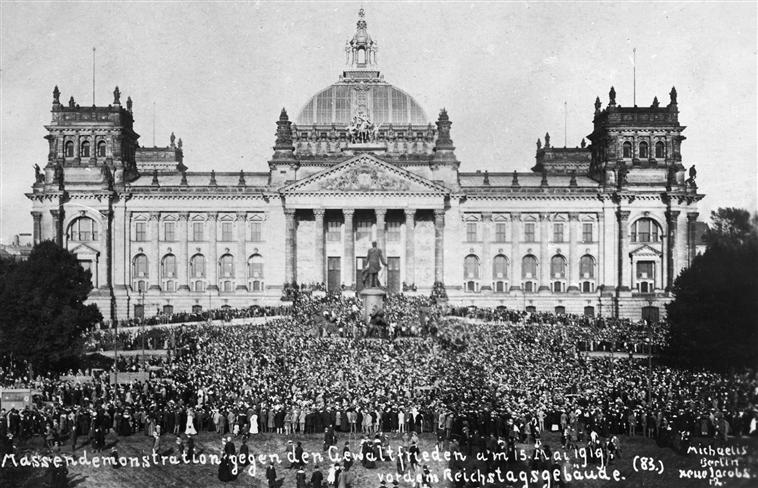
Public domain via Wikmedia Commons
The 100th Anniversary of the Treaty of Versailles

Eric Langenbacher
Senior Fellow; Director, Society, Culture & Politics Program
Dr. Eric Langenbacher is a Senior Fellow and Director of the Society, Culture & Politics Program at AICGS.
Dr. Langenbacher studied in Canada before completing his PhD in Georgetown University’s Government Department in 2002. His research interests include collective memory, political culture, and electoral politics in Germany and Europe. Recent publications include the edited volumes Twilight of the Merkel Era: Power and Politics in Germany after the 2017 Bundestag Election (2019), The Merkel Republic: The 2013 Bundestag Election and its Consequences (2015), Dynamics of Memory and Identity in Contemporary Europe (co-edited with Ruth Wittlinger and Bill Niven, 2013), Power and the Past: Collective Memory and International Relations (co-edited with Yossi Shain, 2010), and From the Bonn to the Berlin Republic: Germany at the Twentieth Anniversary of Unification (co-edited with Jeffrey J. Anderson, 2010). With David Conradt, he is also the author of The German Polity, 10th and 11th edition (2013, 2017).
Dr. Langenbacher remains affiliated with Georgetown University as Teaching Professor and Director of the Honors Program in the Department of Government. He has also taught at George Washington University, Washington College, The University of Navarre, and the Universidad Nacional de General San Martin in Buenos Aires, Argentina, and has given talks across the world. He was selected Faculty Member of the Year by the School of Foreign Service in 2009 and was awarded a Fulbright grant in 1999-2000 and the Hopper Memorial Fellowship at Georgetown in 2000-2001. Since 2005, he has also been Managing Editor of German Politics and Society, which is housed in Georgetown’s BMW Center for German and European Studies. Dr. Langenbacher has also planned and run dozens of short programs for groups from abroad, as well as for the U.S. Departments of State and Defense on a variety of topics pertaining to American and comparative politics, business, culture, and public policy.
__
Among the many important dates that we largely overlooked is the 100th anniversary of the Treaty of Versailles, the treaty that ended the state of war between Germany and the Entente powers. After the armistice on November 11, 1918, the treaty was negotiated over the first half of 1919, signed in June, ratified on October 21, and came into force in January 1920.
There is probably no other peace treaty in the history of the world that is so well known, so discussed, and so vilified as this one.
It is a little curious that this anniversary has gone rather unnoticed. There is probably no other peace treaty in the history of the world that is so well known, so discussed, and so vilified as this one. Universally condemned in Germany as the Versaillesdiktat, it was long thought to have contributed to the ruinous hyperinflation of 1923 and was a major motivating force for the rise of Hitler and the Nazi Party. Indeed, Hitler’s greatest and most popular successes of the 1930s revolved around undoing aspects of the Treaty and the overall settlement—ending reparation payments, remilitarizing the Rhineland, Anschluss with Austria, and annexation of the Sudetenland.
We should not forget that for most Germans, they didn’t really feel that they had lost the war. In fact, they had won the war against the hated Russians and imposed a draconian peace on the new Bolshevik government. In the Treaty of Brest-Litovsk, the Soviet Union lost one-third of Tsarist Russia’s population, including the newly independent Baltic states and Ukraine; was deprived of 54 percent of its industrial production; and pledged to pay 300 million gold marks to Germany. Moreover, hardly any German territory had witnessed a battle or suffered any damage, occupation, etc. In the east, the Russians had invaded parts of East Prussia in the first month of the war and were defeated at the Battle of Tannenberg in August 1914 and elsewhere. The final armistice line in the West was still deep into French and Belgian territory, rather far from the prewar German border.
Germans felt they had sacrificed a lot: 2 million fallen soldiers (the most of any combatant); mobilization affected about 17 percent of the entire population; over 400,000 civilians died due to malnutrition and other war-related causes (British naval blockade, the Turnip winter of 1916-1917); and the cost was in the billions of dollars. Under these circumstances and with these perceptions, conspiracy theories abounded, particularly the Dolchstosslegende—the stab-in-the back. It was widely believed (especially on the right) that the German Army had not lost the war, but it was rather domestic traitors—leftists, republicans, and Jews—that led to the government and military’s collapse. Those who signed the armistice were deemed the “November criminals.”
In any case, the eventual peace treaty was vilified almost from the start and not just in Germany—Keynes’ famous moniker of a “Carthingian Peace” comes to mind. The terms of the peace indeed appeared harsh and punitive. Germany lost Alsace-Lorraine to France, north Schleswig to Denmark, Eupen to Belgium, the Memelland to Lithuania; Posen, West Prussia, and a small part of Upper Silesia went to a newly-formed Polish state. Danzig and the Saarland were regions administered by the League of Nations. It had to give up all its colonies. The Rhineland (left bank) was demilitarized. The German army was highly restricted and limited to 100,000 men. Most naval ships were handed over to the allies and scuttled. Reparations of 20 billion gold marks were assessed. Finally, and most egregious to Germans of all political stripes was the war guilt clause—where Germany was forced to accept sole responsibility for the aggression that led to the outbreak of the war.[1]
What were the consequences? German nationalism was even more empowered—now coupled with a deep sense of victimization.
And what were the consequences? German nationalism was even more empowered—now coupled with a deep sense of victimization. Ethnic Germans now living in foreign states such as Poland, Hungary, or Czechoslovakia became destabilizing forces. The status of the rump Austrian state was an open question. The country was fundamentally revisionist. The new democratic system was founded under the least auspicious circumstances imaginable. Partially as a consequence of the reparations bill, the hyperinflation of 1923 devastated the economy and led to the French occupying the Rhineland. Almost everyone feared destabilization, collapse, and a return to hostilities. Indeed the connection between the two wars and between the Treaty of Versailles and WWII have long been recognized.[2] In fact, many historians see the two wars as manifestations of one overarching global conflict.
Perhaps unsurprisingly, some historians have tried to reassess and revise our understanding of the treaty. Some have pointed out that the treaty was much more lenient on Germany than wartime German plans to annex most of the continent—or than the Treaty of Brest Litovsk was in actual fact. Others have pointed out that the German Reich remained intact and geopolitically Germany was actually strengthened given the demise of the eastern empires, replaced by new, small, and weak states. Moreover, reduced military expenditure should have created more than enough fiscal capacity to pay the reparations.[3] Nevertheless, as with so many other things, this was not the perception of the Treaty at the time.
Memory almost always says more about the present than the past. Our circumstances and values today create our perceptions of the past.
So, how should we remember the Treaty today? Was it a classic example of punitive victor’s justice, creating more problems than it solved? Was it the best anyone could hope for after such a deadly and costly war? Or was it not as bad as people at the time thought? Perhaps it is all of the above. But one thing is certain. Memory almost always says more about the present than the past. Our circumstances and values today create our perceptions of the past. Today, in the face of rising, revalidated nationalism and democratic stagnation, even erosion, World War I and the Treaty of Versailles should be remembered as admonitions regarding the destructiveness of nationalism and unaccountable elites.
[1] Christopher Clark, Sleepwalkers: How Europe Went to War in 1914 (New York: Harper Perennial, 2014).
[2] Jonathan Wright, Germany and the Origins of the Second World War (London: Palgrave Macmillan, 2007).
[3] Richard Evans, In Hitler’s Shadow (New York: Pantheon 1989); Detlev Peukert, The Weimar Republic (New York: Hill & Wang, 1993); Gerhard L. Weinberg, A World at Arms: A Global History of World War II (Cambridge, UK: Cambridge University Press, 1994).








